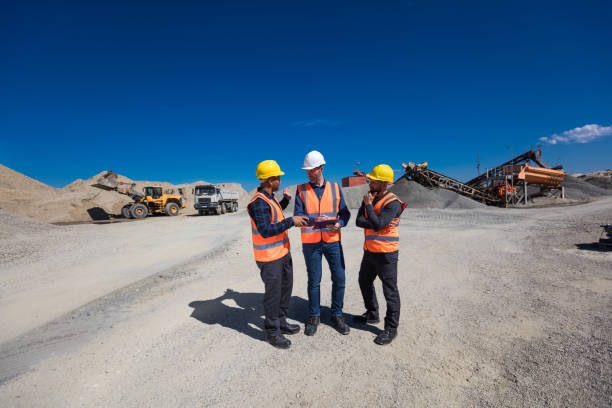
| Mining Engineer Key Stats | |
|---|---|
| Education | 4+ Years |
| Job Outlook | 3% |
A Mining Engineer’s professional goal is to design, create and manage the making of mineshafts in order to extract materials such as metals, minerals and coal.
These extracted natural resources are necessary in order to create energy sources as well as consumer goods.
The extracted natural resources are typically used in the utilities and manufacturing industries.
Mining Engineers implement their knowledge of science, physics and math in order to excavate these materials but at the same time are responsible for creating the safest environment for miners performing the extractions.
The types of mines they design include open pit and underground mines.
These professionals can work in conjunction with several other experts such as geologists and metallurgical engineers in order to locate potential deposits of natural resources.
Interested students who want to become a Mining Engineer should have a keen interest in science, math and physics in order to prepare themselves for working in this industry.
Related careers include the following:
- Computer Engineer
- Electronics Engineer
- Electrical Engineer
- Environmental Engineer
- Industrial Engineer
- Mechanical Engineer
- Nuclear Engineer
All these professions require a strong knowledge in mathematical and science based concepts.
A student will need to determine the area of expertise they are interested in order to choose the right engineering career for themselves.
Table of Contents
Education Requirements to Become a Mining Engineer
In order to become a Mining Engineer, a candidate should have a strong knowledge in math and science.
In addition, future Mining Engineers would benefit from having a strong interest in the extraction of natural resources and determining ways that are efficient and structured with the highest level of safety for the extractors.
All candidates looking into engineering need a minimum of a Bachelor’s degree in Engineering or related track.
Most Engineering programs require students to choose specialty and also have them take important courses such as mathematics, life and physical sciences in order to create a larger scope of knowledge.
Candidates interested in this field need to study a Mining Engineering track.
Someone who wants to learn become a Mining Engineer can also enter a track specializing in Engineering and the earth Sciences.
Other helpful tracks that can help you become a Mining Engineer include Chemical Engineering, Mechanical Engineering or a General Engineering Degree.
Mining Engineer Job Description
Mining Engineers are involved in the designing and creation of mines in order to help extract the earth’s natural resources.
Mining Engineers are involved in the mining process from beginning to end.
They complete their duties by creating a mining plan, monitoring the construction of mines and supervising miners during excavation.
In collaboration with other professionals such as Petroleum Engineers, Environmental Engineers or Geological Engineers, they also generate a plan that focuses on the mining operation.
Mining Engineers must create mineshafts that uphold the highest safety standards and the most secure environment for miners going into the depths of the earth.
These professionals are also responsible for managing and supervising the extraction process in order to ensure that the mining is being done in the most efficient and safest way possible.
They may troubleshoot any potential problems that would affect the mining and create resolutions for an efficient process.
Mining Engineers are also responsible for developing mining equipment and techniques.
A recent shift in protecting the environment has challenged these professionals to design and implement mining processes that are both efficient and safe for the environment.
These professionals may work with Environmental Engineers to assure that local, State or Federal laws are implemented and achieved.
While on duty, Mining Engineers split their time at the office preparing the design and processes for excavation and visiting the mining sites in order to supervise and assure the excavating process is being done correctly.
Mining Engineer Salary and Career Path
Engineers are some of the highest paid workers among other professionals with a Bachelor’s Degree.
The national average for those specializing in Mining Engineering is approximately $64,400 per year, according the Bureau of Labor Statistics.
The highest paying engineering specialization is in Petroleum which on average pays a yearly salary of $83,000 per year.
![]() The below information is based on the 2023 BLS national averages.
The below information is based on the 2023 BLS national averages.
National Average Salary
$105,460Average Salary by State
| State | Avg. Annual Salary |
|---|---|
| Alabama | $85,150 |
| Alaska | $128,760 |
| Arizona | $100,150 |
| California | $127,130 |
| Colorado | $131,920 |
| Florida | - NA - |
| Georgia | - NA - |
| Idaho | - NA - |
| Indiana | $113,290 |
| Kentucky | $100,760 |
| Maryland | $82,420 |
| Michigan | $96,660 |
| Minnesota | $105,460 |
| Missouri | $103,430 |
| Montana | $94,770 |
| Nebraska | $89,600 |
| Nevada | $109,940 |
| New Mexico | $126,660 |
| New York | $90,390 |
| North Carolina | $84,580 |
| Ohio | $81,480 |
| Oklahoma | $119,030 |
| Oregon | $96,110 |
| Pennsylvania | $73,190 |
| South Dakota | $94,970 |
| Tennessee | $100,500 |
| Texas | $102,530 |
| Utah | $104,920 |
| Virginia | $101,710 |
| Washington | $93,740 |
| West Virginia | $96,830 |
| Wyoming | $112,710 |
The top earning state in the field is Colorado, where the average salary is $131,920.
These are the top 5 highest-paying states in the field:
* Employment conditions in your area may vary.
Frequently Asked Questions
What does a mining engineer do?
Mining engineers design safe and efficient ways of removing minerals from the Earth.
They design open-pit and underground mines, supervise the construction of mine shafts and tunnels and ensure that the minerals are removed in safe and environmentally sound ways.
Coal, metals, and minerals are used in many products, from construction materials to computers.
Mining engineers often specialize in one particular metal or mineral.
Sometimes they work with geoscientists and metallurgical engineers.
Mining engineers need analytical and decision-making skills but also logical thinking and math skills.
Mining engineers also need writing skills because they must prepare clear reports and instructions for other workers.
Because some mines are located in remote areas, mining engineers often work on variable schedules, and may have to work overtime in some weeks.
How much does a mining engineer make?
According to the Bureau of Labor Statistics, the median annual wage for mining and geological engineers was $92,250 in May 2015.
The salary varies depending on a wide range of factors, including the engineer’s level of experience, the region, and his or her employer.
The annual wages for this profession start at less than $55,000 and top out at over $150,000 a year.
How much does it cost to become a mining engineer?
Mining engineers need a bachelor’s degree from an accredited institution.
A four-year college program will cost you, on average, around $150,000 but tuition costs vary widely, depending on the college and the program you choose.
In some cases, you will also need to get licensed by the state in which you want to practice.
In order to be licensed as a Professional Engineer, most states require mining engineers to pass two exams: the first one can be taken right after graduating from college while the second and final exam can be taken after gaining a few years of experience.
The licensing exam costs around $350 for most states; this doesn’t include books, courses, and other expenses.
What is the demand for mining engineers?
According to the Bureau of Labor Statistics, employment for mining and geological engineers is expected to grow 3 percent from 2018 to 2028.
Employment in this field depends on the demand for coal, metals, and minerals.
These materials are used in manufacturing a variety of products, from cars to cell phones.
However, in order to reduce costs, many companies prefer to contract engineering services firms, rather than hire engineers.
So, in some areas, there may be fewer mining engineering jobs available for new graduates.
Having a few years of experience in the field can give you an advantage over your competitors on the job market.
How long does it take to become a mining engineer?
In order to become a mining engineer, you will need to graduate from a four-year bachelor’s degree program.
Many states also require that mining engineers be licensed.
In order to get your license, you will need to pass two exams and to gain around four years of work experience.
In some states, mining engineers also need continuing education credits in order to keep their license.
Some companies provide their new mining engineers with formal classroom training.
New engineers usually start by working under the supervision of a more experienced engineer and gradually gain more independence and responsibility.













